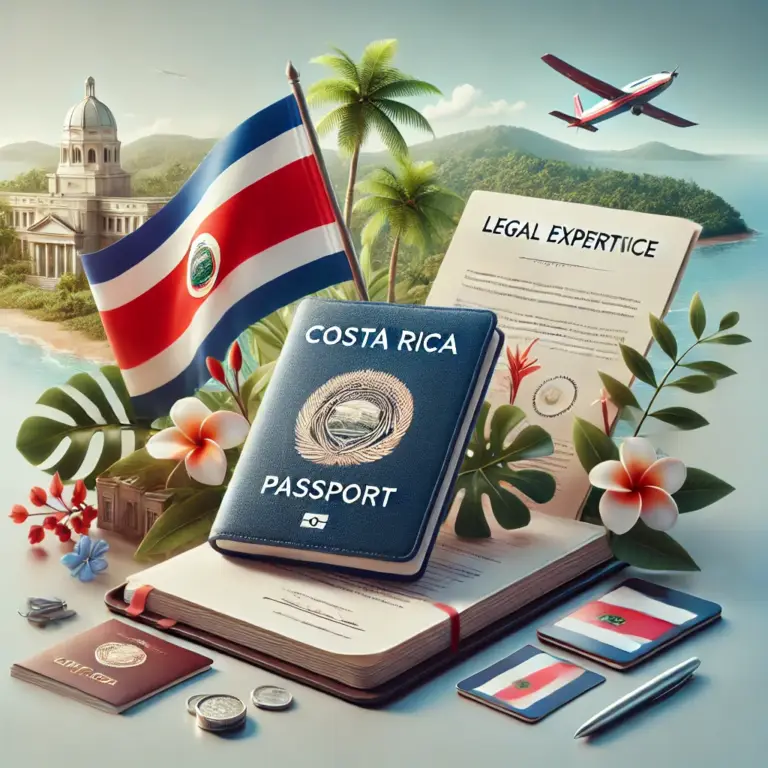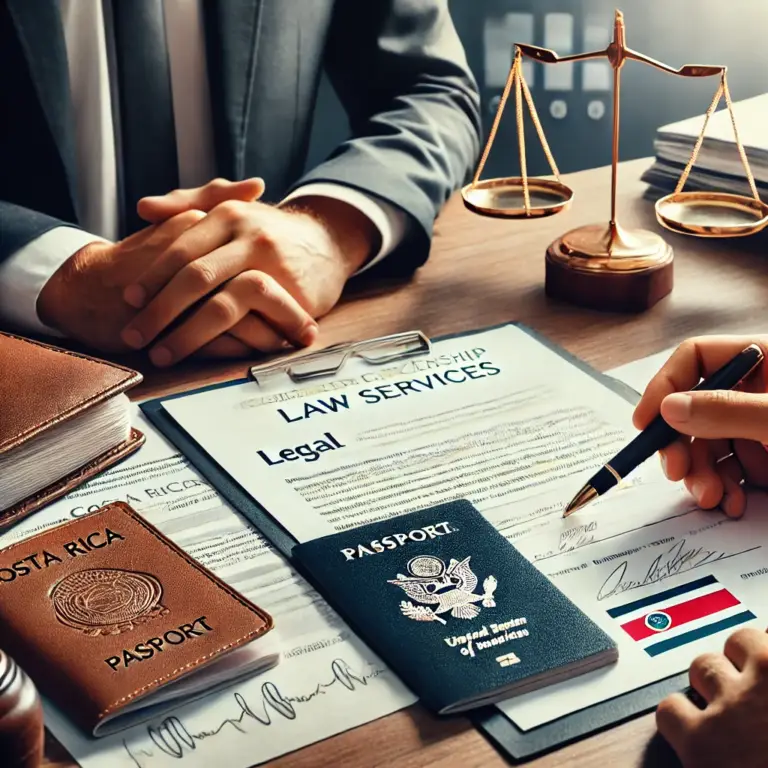Pathways to Dual Citizenship and Obtaining a Costa Rican Passport
Embarking on the journey to secure a Costa Rican passport opens up a world of possibilities, especially for those pursuing dual citizenship in Costa Rica. Our legal framework welcomes foreigners seeking to make this dynamic country their home, whether through marriage or residency.
With the expert support of CPG Legal’s immigration professionals, individuals can navigate the naturalization process with confidence and clarity. Our firm excels in guiding clients through each step and ensuring compliance with all Costa Rican government requirements.
Achieving dual citizenship in Costa Rica not only provides global opportunities but also enriches personal experiences with cultural depth and economic freedom. Discover how becoming a Costa Rican citizen can reshape your perspective and enhance your personal identity.

Acquiring Costa Rican citizenship through marriage:
Marrying a Costa Rican citizen allows individuals to pursue citizenship, provided certain requirements are fulfilled. Applicants must remain married to their Costa Rican spouse for at least two years. You must also reside continuously in Costa Rica during this period.
It’s important to understand that any time spent outside the country pauses the residency requirement, resuming only upon return. This process calls for patience and commitment, ensuring that applicants fully integrate into the local society.
Accurate documentation is essential for a smooth application. Applicants must submit a birth certificate and background check, both authenticated with an Apostille or legalization, along with passport-sized photos and a valid passport with an entry stamp.
Meeting these conditions sets the path toward dual citizenship through marriage, a significant step toward deeper integration into Costa Rican life and accessing the benefits of citizenship. Additionally, pursuing citizenship through residency is another pathway worth considering.
Acquiring Costa Rican citizenship through residency:
Expatriates living in Costa Rica may apply for citizenship through residency after fulfilling certain criteria, representing a major step toward securing dual citizenship. Those who have maintained temporary or permanent residency for seven years (for citizens of English-speaking countries) or five years (for citizens of Spanish-speaking countries) become eligible to move forward in this process.
Applicants must also pass written exams in Spanish and Social Studies, with an exemption granted to those over 65. This citizenship route reflects Costa Rica’s inclusive efforts to integrate expatriates into its vibrant culture and community.
Once the eligibility requirements are satisfied, individuals can navigate the citizenship process with the help of legal professionals in Costa Rica who specialize in immigration and nationality law.
Upon approval, successful applicants enjoy the advantages of dual nationality, enabling them to live and work freely in Costa Rica while maintaining their connection to their country of origin. The next phase involves gathering all necessary documentation for submission to the Civil Registry of Costa Rica, ensuring candidates are thoroughly prepared for the application process.
The Costa Rican Citizenship Process:
The citizenship process is carefully managed by the Tribunal Supremo de Elecciones, which ensures that every application adheres to the country’s legal standards. Individuals applying for naturalization should anticipate a period of 10 to 12 months from submission to approval, reflecting Costa Rica’s dedication to a comprehensive review and successful integration of new citizens.
This timeframe underscores Costa Rica’s commitment to welcoming newcomers while maintaining stringent standards for legal residency and national integrity.
Gaining Costa Rican citizenship involves obtaining a passport and becoming part of a community that cherishes its rich cultural heritage and biodiversity.
With the possibility of dual citizenship, applicants can retain their original nationality while embarking on a new journey that bridges two nations. Additionally, citizenship can be obtained through marriage, offering another route for expatriates looking to immerse themselves in Costa Rican society.
What documents are needed for Costa Rican citizenship?
Once the residency requirement has been met, compiling the necessary documentation is the next essential step in obtaining Costa Rican citizenship. This stage is crucial, as missing or incorrect paperwork can delay or hinder the process. Pirie Legal, with its extensive experience in citizenship matters, helps clients navigate this complex phase, ensuring all requirements are met without oversight.
An apostilled birth certificate:
You must provide an official birth certificate authenticated for use in Costa Rica through an apostille or legalization process, verifying its legitimacy and accuracy.
Apostilled or legalized background check:
A comprehensive background check from your home country, proving a clean legal record. This document must be apostilled or legalized to meet Costa Rican legal standards.
Passport - sized photographs:
You will need recent passport-sized photos for identification purposes during the citizenship application process.
Valid passport with an entry stamp:
A valid passport with a Costa Rican entry stamp is essential to prove lawful entry into the country, demonstrating your legal status and ongoing residency.
Official translations to Spanish:
All required documents must be translated into Spanish, Costa Rica’s official language, by an accredited translator. This ensures that immigration officials can accurately review and understand the submitted paperwork.
Sworn affidavits from two witnesses:
Two witnesses must provide sworn statements that vouch for your character and intentions in Costa Rica, affirming your suitability for citizenship. The sworn affidavits must be notarized.

Statement Declaring a Clean Record with Costa Rican Law:
Submit a formal statement declaring that you have adhered to Costa Rican laws and maintained good legal standing during your time in the country.
Special Power of Attorney:
For a more streamlined process, you can authorize legal representatives to act on your behalf by granting them a special power of attorney. This allows your representative to handle various stages of the citizenship process, including interactions with governmental agencies and managing specific dual citizenship requirements.
The advantages of obtaining Costa Rican Citizenship
Costa Rica, renowned for its breathtaking natural beauty and progressive policies, offers numerous benefits for those considering dual citizenship. Beyond its lush landscapes and welcoming climate, the country provides a host of practical, economic, and lifestyle advantages that make it an attractive destination for new citizens.
Ensuring that all required documents are in order is a critical step in applying for Costa Rican citizenship. With the guidance of experienced legal experts by CPG Legal, you can feel confident that no detail will be overlooked. Proper preparation and thorough documentation make the path to Costa Rican citizenship smoother and more efficient, helping you achieve dual nationality and fully integrate into Costa Rica’s vibrant community.
Dr. Christopher Pirie Gil.